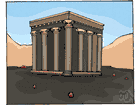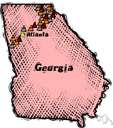Athens
Also found in: Thesaurus, Medical, Acronyms, Idioms, Encyclopedia, Wikipedia.
Ath·ens
(ăth′ənz)1. The capital and largest city of Greece, in the eastern part of the country near the Saronic Gulf. It was at the height of its cultural achievements and imperial power in the fifth century bc during the time of Pericles. Athens became the capital of modern Greece in 1834, two years after the country achieved its independence from Turkey.
2. A city of northeast Georgia east-northeast of Atlanta. It was founded in 1785 as the site of the University of Georgia, which was chartered that year and established in 1801.
American Heritage® Dictionary of the English Language, Fifth Edition. Copyright © 2016 by Houghton Mifflin Harcourt Publishing Company. Published by Houghton Mifflin Harcourt Publishing Company. All rights reserved.
Athens
(ˈæθɪnz)n
(Placename) the capital of Greece, in the southeast near the Saronic Gulf: became capital after independence in 1834; ancient city-state, most powerful in the 5th century bc; contains the hill citadel of the Acropolis. Pop: 3 238 000 (2005 est). Greek name: Athinai or Athina
Collins English Dictionary – Complete and Unabridged, 12th Edition 2014 © HarperCollins Publishers 1991, 1994, 1998, 2000, 2003, 2006, 2007, 2009, 2011, 2014
Ath•ens
(ˈæθ ɪnz)n.
1. Greek, A•the•nai (ɑˈθi nɛ) the capital of Greece, in the SE part. 885,136: ancient city-state.
2. a city in N Georgia. 42,549.
Random House Kernerman Webster's College Dictionary, © 2010 K Dictionaries Ltd. Copyright 2005, 1997, 1991 by Random House, Inc. All rights reserved.
ThesaurusAntonymsRelated WordsSynonymsLegend:
Switch to new thesaurus
| Noun | 1. |  Athens - the capital and largest city of Greece; named after Athena (its patron goddess); "in the 5th century BC ancient Athens was the world's most powerful and civilized city" Athens - the capital and largest city of Greece; named after Athena (its patron goddess); "in the 5th century BC ancient Athens was the world's most powerful and civilized city"Parthenon - the main temple of the goddess Athena; built on the acropolis in Athens more than 400 years B.C.; example of Doric architecture Ellas, Greece, Hellenic Republic - a republic in southeastern Europe on the southern part of the Balkan peninsula; known for grapes and olives and olive oil Areopagus - a hill to the to the west of the Athenian acropolis where met the highest governmental council of ancient Athens and later a judicial court Dipylon, Dipylon gate - a gateway to the west of ancient Athens near which a distinctive style of pottery has been found Athenian - a resident of Athens Plato - ancient Athenian philosopher; pupil of Socrates; teacher of Aristotle (428-347 BC) |
| 2. |  Athens - a town in southeast Ohio Athens - a town in southeast Ohio Buckeye State, OH, Ohio - a midwestern state in north central United States in the Great Lakes region | |
| 3. |  Athens - a university town in northeast Georgia Athens - a university town in northeast GeorgiaEmpire State of the South, Georgia, Peach State, GA - a state in southeastern United States; one of the Confederate states during the American Civil War |
Based on WordNet 3.0, Farlex clipart collection. © 2003-2012 Princeton University, Farlex Inc.
Translations
Атина
AtényAthény
Ateena
Ateena
Athén
아테네
Athenae
Atėnai
Atēnas
Ateny
Atena
Atene
Atina
Collins Spanish Dictionary - Complete and Unabridged 8th Edition 2005 © William Collins Sons & Co. Ltd. 1971, 1988 © HarperCollins Publishers 1992, 1993, 1996, 1997, 2000, 2003, 2005
Collins English/French Electronic Resource. © HarperCollins Publishers 2005
Athens
n → Athen nt
Collins German Dictionary – Complete and Unabridged 7th Edition 2005. © William Collins Sons & Co. Ltd. 1980 © HarperCollins Publishers 1991, 1997, 1999, 2004, 2005, 2007
Collins Italian Dictionary 1st Edition © HarperCollins Publishers 1995